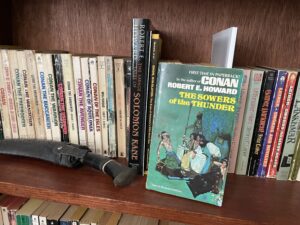
I won’t delay any surprise here: the anthology of Robert E. Howard historical novellas The Sowers of the Thunder is an absolute treat. There, you can head off the used bookstore or open another tab and start the hunt at eBay or ThriftBooks. Or you can stay and keep reading.
Roy G. Krenkel’s introduction is as consummately masterful as the beautiful spot illustrations and occasional full page pieces liberally scattered throughout the volume. He writes a poignant, elegiac essay, an affirmation for aficionados of REH.
The first novella is The Lion of Tiberias. I’m about to be as critical as I get in this review, which isn’t very. Though written with customary Howardian verve, Lion reads almost like the sketch of a historical novel. It is a somewhat disjointed Crusader-era piece, primarily about the career of a Turkish warlord. Unfocused, perhaps, but still enjoyable. Conan fans might find this quote evocative: “I have spilled rivers of gore for the glory of Allah, but I have never asked mercy or favor of him. What care the gods if a man lives or dies? Let me live deep, let me know the sting of wine in my palate, the wind in my face, the glitter of royal pageantry, the bright madness of slaughter — let me burn and sting and tingle with the madness of life and living, and I quest not whether Muhammad’s paradise, or Erlik’s frozen hell, or the blackness of empty oblivion lies beyond.” John Norwald and Miles du Courcey are Howard’s heroes in this piece, though the focus is on the warlord Zenghi esh Shami. Howard sets the tone for the rest of the tales in this volume, fitting a fictional framework around real historical figures and events, inserting his own characters into the stories to greater or lesser extent.
The Sowers of the Thunder. Another Crusader-era novella, brawling and glorious, set against the backdrop of eastern hordes rolling westward from the steppes. We’ve advanced a century or so in the timeline, the anthology following a chronological order. It features Red Cahal O’Donnel, an Irish prince and another of Howard’s tough, tragic adventurers. Of note is a brief reference to Shahrazar, a link to the Kirby O’Donnell of later centuries (viz. The Swords of Shahrazar) another of Howard’s adventurers. Sowers also features the historical figure Baibars (or Baybars) whom Howard limns with gusto. I enjoyed this one, and — with a different, less tragic ending — this might have been one of my favorite REH yarns. I admit it: my preference is for a happy ending, sap that I am.
Lord of Samarkand. The steppe horde motif continues in this novella about Tamerlane. We are introduced to another Howard hero, the Scott Donald MacDeesa. Howard opens by recounting the Battle of Nicopolis, during which knightly pride overwhelms tactical sense and leads to a disaster. We also get references to the Ballad of Chevy Chase (or the Ballad of the Battle of Otterbourne.) Howard’s research really shines in this one. It is a story of bleak, almost despairing, existential darkness, describing the long reign and bloody conquests of Tamur the Lame. Powerful in a way, though absent some of the lustful joie de vivre of some of REH’s other yarns.
The Shadow of the Vulture. Our Howard here this time is Gottfried von Kalmbach and the period is the reign of Suleiman the Magnificent. von Kalmbach is a change of pace from the more typical REH hero: a drunk without a driving passion or vengeful motivation. He’s a man with a touch of the Falstaffian. The bulk of the story is set during the Siege of Vienna. For me that event conjures memories of Tim Powers’ The Drawing of the Dark (which you should read forthwith if it has somehow escaped you all this time.) And Red Sonya becomes involved! Did I mention Red Sonya? After the previous story it was a pleasure to round out this volume with a triumphant tale.
This book is a treasure, one that would grace any shelf of REH fiction. Go forth and acquire your own copy.
While you’re in the bibliophilic process of acquisition, why not pick up something of mine? I’ll point a finger at the vanity shelf and select at random…Under Strange Suns. Also available from Barnes and Noble.
Moving on, here is the next entry in Magnus Stoneslayer’s diary.
SAVAGE JOURNAL
ENTRY 45.
There are, dear diary, habitations and homes. Both are abodes, but there is a subjective, qualitative difference between the two. I’ve had any number of habitations, yet with the exception – perhaps – of my youth in the tribal lodge, I’ve not had a home. Habitations provide essential shelter, but they do not provide the intangible benefits that most people derive from homes. The itinerant barbarian dispenses with such sentimentality, without necessarily remaining unmoved by it; the tug is there, but it is light and easily ignored.
I left yet another habitation this morning. I bade farewell to my ship and crew, leaving them, under the leadership of my lieutenant, to return to their role as terror of the Zajsan Sea, though now with a list of select targets of opportunity: trading vessels owned by specific Zantian Counselors whose reverses would be to Yaslina’s advantage. We had evaded Zantian patrol galleys and made landfall in a secluded inlet tucked away in the northwest of the inland sea. Followed by Yaslina, Vetrius, and two crew members who’d elected to accompany us (former Zantian legionaries – a commander of a Hundred and a leader of a Ten, to employ Legion parlance) I led, as stealthily as possible, to the northwest. Well, I led literally, striding at the fore, but I was following directions provided by Yaslina. We were treading ground in the easternmost province of the Empire, potentially dangerous territory for all of us: a fugitive Zantian noblewoman, her loyal wizard retainer, two renegade soldiers turned pirate, and a barbarian cum pirate chief. Oh, we’d be quite a haul for an ambitious Imperial officer.
Potentially dangerous, I said, yet not overly fraught. A relative of Yaslina’s, her uncle, an Imperial Counselor, owned an estate not far inland, about a half day’s journey from the Imperial port city of Tarpeius, situated in a natural harbor disturbingly few leagues to the east of where we’d briefly dropped anchor. He sympathized with Yaslina’s cause. As near as I can understand the politics, Yaslina and her uncle Ancus are of a party motivated by concerns over corruption in the higher echelons of the Imperial machinery, corruption reaching all the way to the throne. It was Yaslina’s dedication to fighting this internal rot that resulted in her flight. (It seems a futile cause to me. Curing civilization of corruption would be akin to curing an elephant of its trunk. But I will leave the politics to Yaslina.)
Now I sit, ensconced in Ancus’ private study in his sprawling estate, surrounded by mementos of his years in the Legion: captured enemy standards; swords; awards for valor, the assorted bric-a-brac accumulated over the course of a dozen campaigns. He’s a white-haired gentleman, still hale and un-stooped. He displays no discomfort over conversing with a barbarian, instead sharing admiring tales of some he’d known and battled, shaking his head and smiling in reminiscence, and pouring me a refill of strong purple wine flavored with exotic spices acquired by his trading concerns in the mysterious east.
I like this man. I like this room. I like the quiet smile Yaslina fails to hide from me. I think, dear diary, that this is what home feels like.
Magnus Stoneslayer
